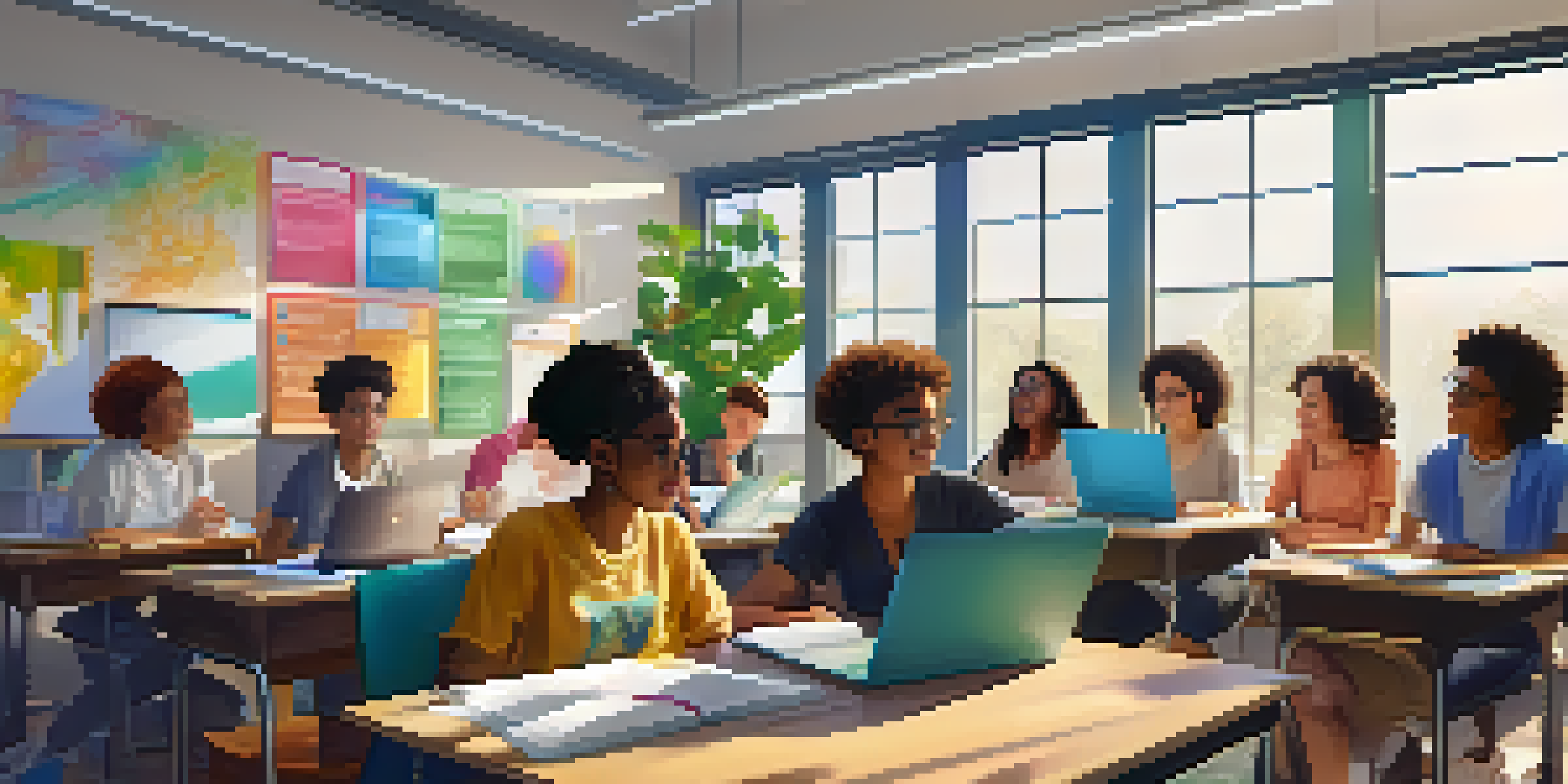Constructivist Learning Theories in Online Education

What is Constructivist Learning Theory?
Constructivist learning theory is based on the idea that learners build their own understanding and knowledge of the world through experiences and reflecting on those experiences. Unlike traditional learning models that often focus on rote memorization, constructivism encourages students to engage with the material actively. For instance, think of a child learning to ride a bike; they learn by trying, falling, and adjusting, rather than just listening to instructions.
Learning is not a spectator sport.
In online education, this theory becomes even more vital as it promotes learner autonomy and critical thinking. Students are encouraged to explore resources, participate in discussions, and collaborate with peers, thereby constructing their knowledge. This active engagement can lead to deeper learning and greater retention of information compared to passive learning methods.
Overall, constructivist learning theory emphasizes the importance of context and interaction in education, making it particularly relevant in the age of digital learning where students can engage with content in diverse and dynamic ways.
Key Principles of Constructivist Learning
Some key principles of constructivist learning include active participation, social interaction, and the importance of context. Active participation means that learners are not just passive recipients of information; they must engage with the material through discussions, projects, and hands-on activities. Social interaction is equally crucial, as learning is often enhanced through collaboration with others, allowing for the exchange of ideas and perspectives.

Contextual learning refers to the idea that knowledge is best understood when it is connected to real-world situations. For example, in an online setting, students might work on projects that relate directly to their interests or future careers, making the learning experience more relevant and meaningful. This principle encourages learners to see the practical applications of their studies.
Constructivist Learning Explained
Constructivist learning theory emphasizes that students build their understanding through active engagement and reflection on their experiences.
These principles, when applied to online education, create a rich, interactive learning environment that can motivate students and foster a deeper understanding of the subject matter.
The Role of Collaboration in Constructivist Learning
Collaboration is a cornerstone of constructivist learning, especially in online education. It allows students to learn from one another and build knowledge collectively. Online tools, such as discussion forums and group projects, facilitate this collaboration, enabling students to share insights and challenge each other's thinking in a supportive environment.
We do not learn from experience... we learn from reflecting on experience.
For instance, a virtual classroom might use breakout rooms for small group discussions, where students can brainstorm and solve problems together. This not only enhances learning but also helps students develop important social skills like communication and teamwork, which are vital in today’s world. The sharing of diverse perspectives can lead to richer learning experiences.
By harnessing the power of collaboration, online educators can create a community of learners who feel connected and invested in their education, even from a distance.
Technology's Impact on Constructivist Learning
Technology plays a significant role in facilitating constructivist learning in online education. With a plethora of digital tools available, educators can design engaging learning experiences that align with constructivist principles. For instance, interactive simulations, multimedia presentations, and gamified lessons can all encourage students to explore and experiment with concepts.
Moreover, technology enables personalized learning paths, allowing students to progress at their own pace. This flexibility is crucial in a constructivist framework, as it acknowledges that each learner has unique needs and experiences. Online platforms can adapt to different learning styles, providing resources that cater to individual preferences.
Collaboration Enhances Learning
Collaboration among students is crucial in constructivist learning, as it allows for shared insights and richer learning experiences.
Ultimately, the integration of technology not only enhances the learning experience but also empowers students to take charge of their education, aligning perfectly with the tenets of constructivist learning.
Creating a Constructivist Online Learning Environment
To foster a constructivist online learning environment, educators must focus on creating an atmosphere that encourages exploration and inquiry. This can be achieved by designing courses that prioritize problem-solving and critical thinking rather than mere content delivery. For example, assignments that require students to investigate real-world issues can greatly enhance engagement and understanding.
Additionally, providing opportunities for feedback and reflection is essential. Students should be encouraged to assess their own learning processes and outcomes, which can lead to greater self-awareness and motivation. Tools like peer reviews and reflective journals can facilitate this process.
By intentionally crafting a learning environment that embodies these principles, educators can help students thrive in their online education journey.
Challenges in Implementing Constructivist Approaches Online
While constructivist approaches offer many benefits, there are challenges in implementing them in online education. One significant hurdle is ensuring that all students have equal access to technology and resources. Without access to reliable internet or devices, some learners may struggle to participate fully in collaborative activities or engage with digital content.
Another challenge lies in the need for educators to shift their teaching mindset. Many instructors are accustomed to traditional methods of teaching and may find it difficult to embrace a more facilitative role in a constructivist framework. Training and support are crucial for helping educators develop the necessary skills and confidence.
Technology's Role in Education
Technology facilitates constructivist learning by providing personalized, interactive experiences that empower students to take charge of their education.
Despite these challenges, the potential rewards of constructivist learning in online education make it a worthwhile endeavor. Overcoming these obstacles can lead to richer, more meaningful learning experiences for students.
Future Directions for Constructivist Learning in Online Education
As online education continues to evolve, the application of constructivist learning theories will likely become even more prominent. Educators are increasingly recognizing the value of personalized and interactive learning experiences, leading to innovative approaches in course design. For instance, the use of artificial intelligence and adaptive learning technologies can further tailor educational experiences to meet individual needs.
Additionally, the rise of virtual and augmented reality presents exciting opportunities for constructivist learning. These technologies can create immersive learning environments where students can experiment and collaborate in ways that were previously unimaginable. Imagine learning about history by virtually stepping into ancient civilizations!

The future of constructivist learning in online education holds great promise, with advancements in technology paving the way for more engaging and effective learning experiences.